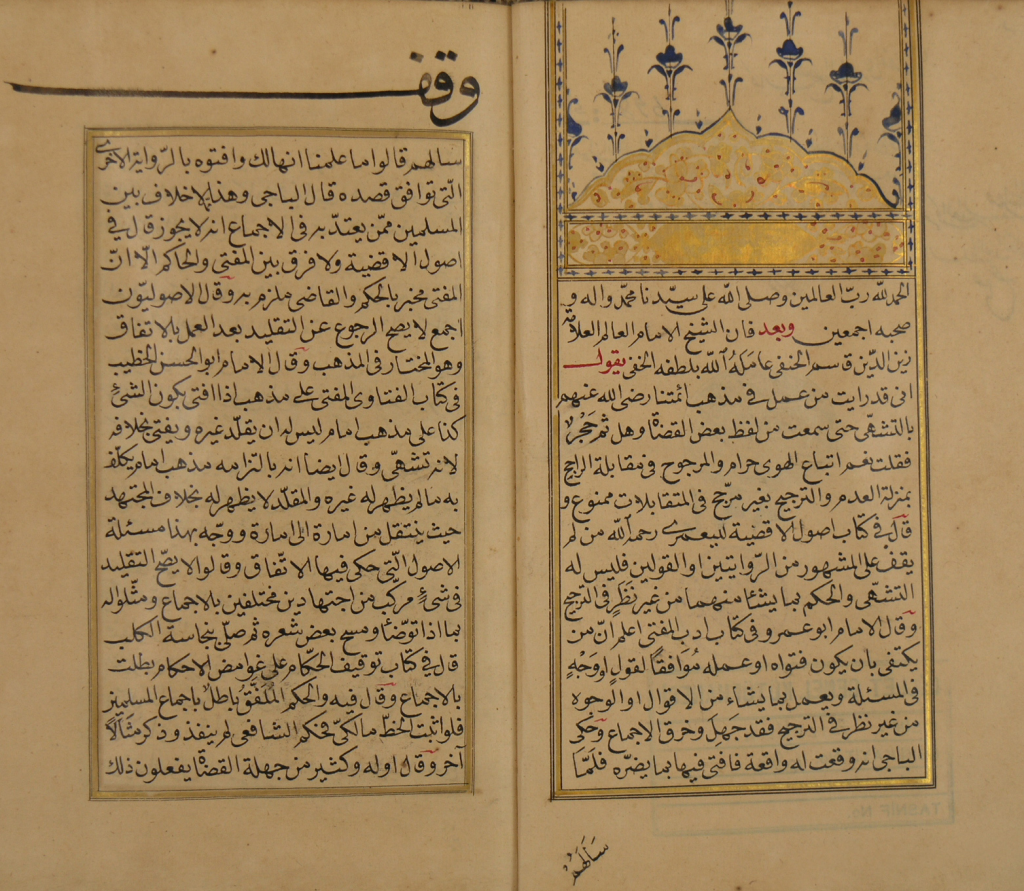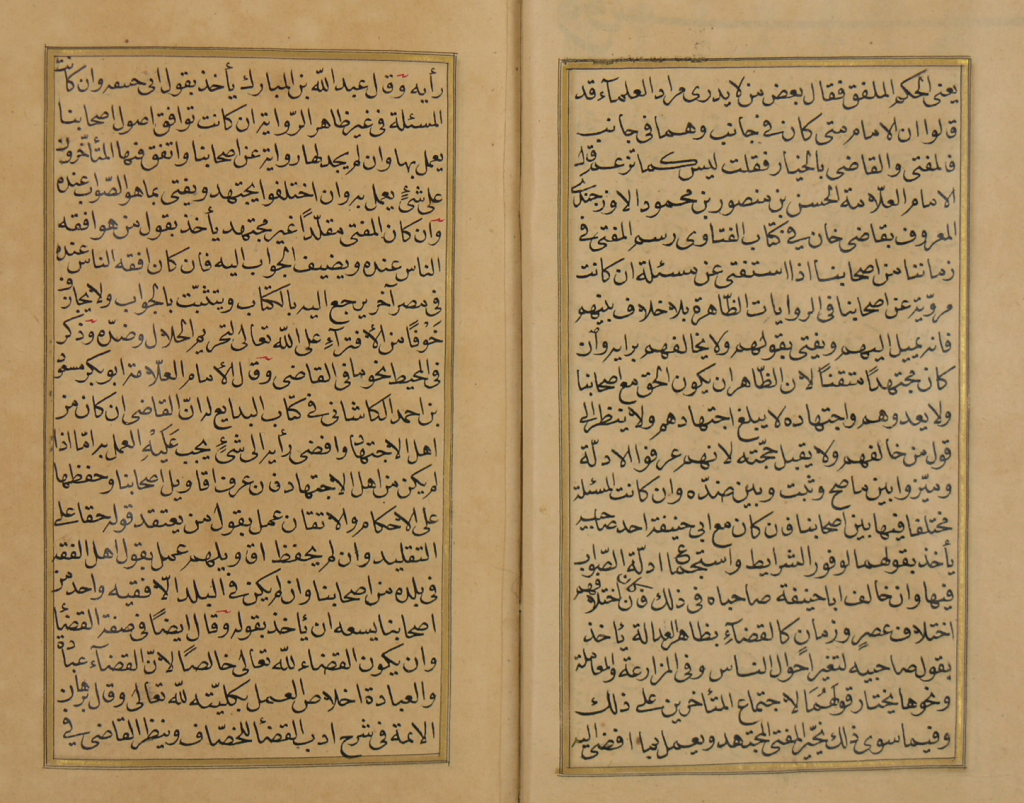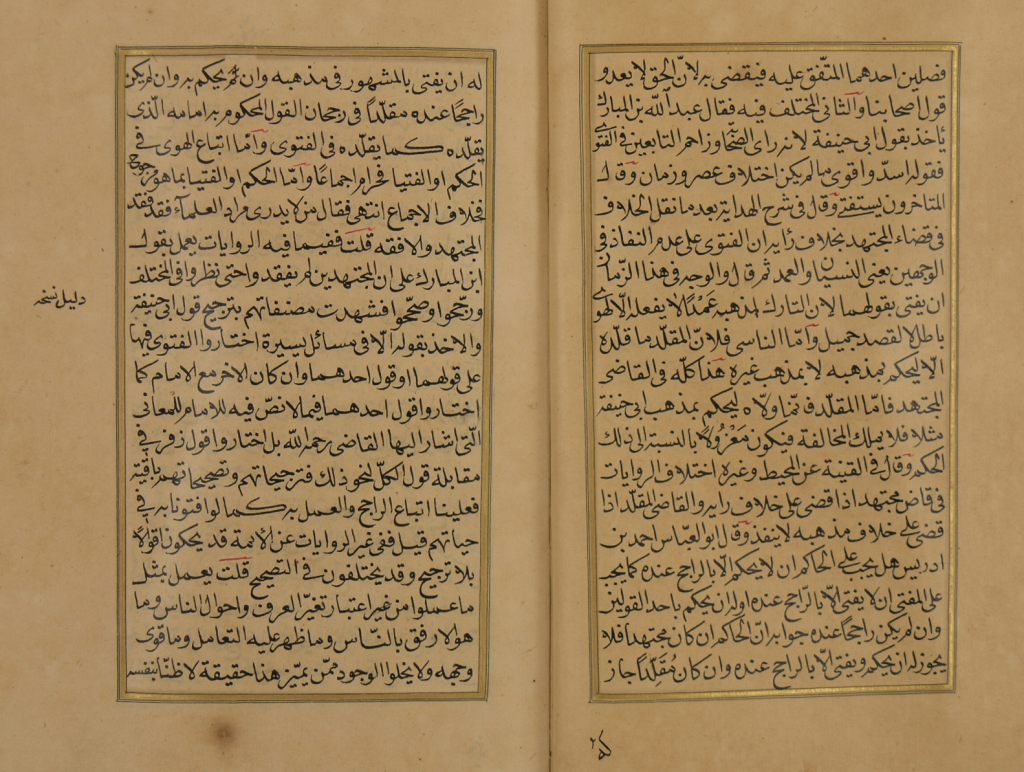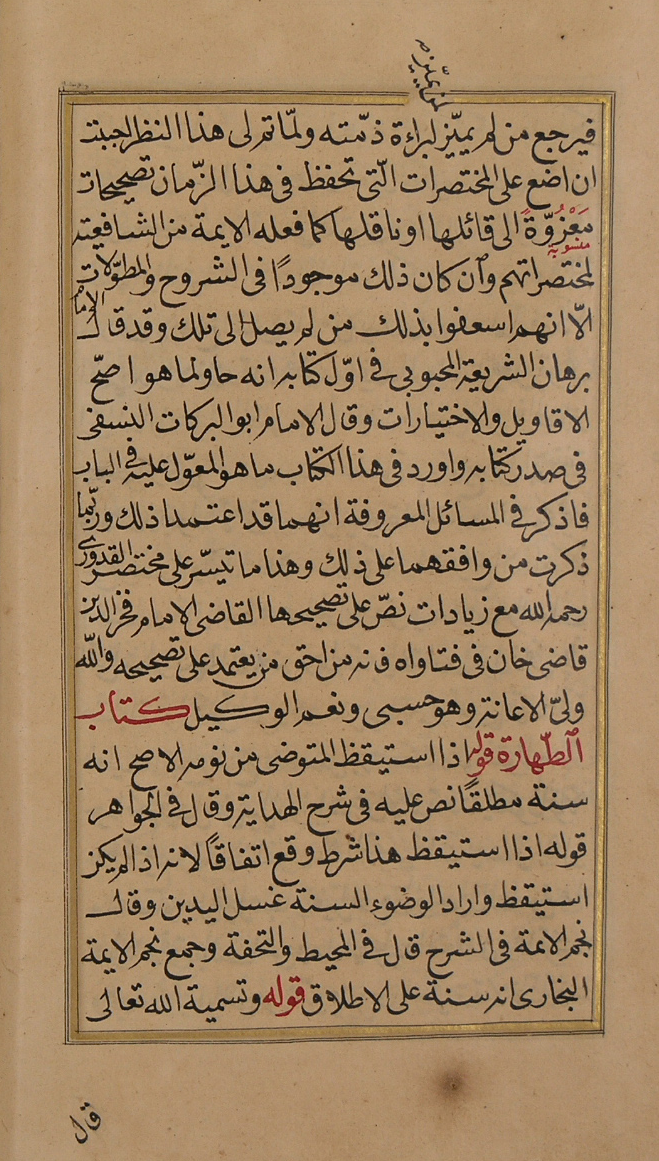Imam Qāsim ibn Quṭlūbughā on how to determine the preponderant view (tarjīḥ) in the Hanafi Madhhab
The following discussion and verdict of the foremost Hanafi jurist and Hadith scholar of his age known as Imam Qāsim ibn Quṭlūbughā (d. 879 AH) has been extracted and presented here from the recently published work entitled, ‘Rule-Formulation and Binding Precedent in the Madhhab-Law Tradition: Ibn Qutlūbughā’s Commentary on The Compendium of Qudūrī’, by Dr. Talal Al-Azem (1st ed. 2016, Leiden: BRILL). The discussion is pertinent in our time due to some misinterpreting and misrepresenting how to determine the preponderant view (tarjīḥ) upon which legal rulings (fatāwā) are adduced and presented within the historically largest Sunni school of jurisprudence, known as the Hanafi Madhhab.
This post has been divided into three parts with a final presentation of the original arabic text from a manuscript copy of Imam Qāsim ibn Quṭlūbughā’s work known as al-Taṣḥīḥ wa-al-tarjīḥ.
1.0 Dr. Talal al-Azem said (p. 22):
“The forum in which rule-determination occurred in the madhhab-law tradition was neither the court room nor the legislative body, but rather juristic writings. It was in legal compendia, commentaries, super-commentaries, and other discursive genres that jurists posited or argued for the pre-eminence of one legal opinion over all the others generated and transmitted by the jurists associated with a given madhhab. Until the appearance of the Majalla as part of Ottoman modernising reforms during the nineteenth century, there was no ‘code’ to which inexperienced jurists, judges, or muftis could turn in order to learn the legal rule to be applied in a given case or issue. Rather, master jurists engaged with their equals, often over a remove of hundreds of years, in different genres of legal writing, most important of which for rule-determination were the legal compendium (mukhtaṣar) and the commentary (sharḥ, and ḥāshiya for super-commentaries).
The commentary al-Taṣḥīḥ wa-al-tarjīḥ of Ibn Quṭlūbughā, and the compendium – simply entitled ‘al-Mukhtaṣar’—of Abū al-Ḥusayn al-Qudūrī, upon which Ibn Quṭlūbughā comments, are two excellent examples of this phenomenon. Each, when it was written, was concerned with establishing the ‘preponderant’ (rājiḥ) opinion of the school on any given issue (masʾala), and each was received, celebrated, and utilised by later jurists in this capacity. However, they were separated by nearly five centuries, two very different intellectual and socio-institutional contexts, and by hundreds of Ḥanafī works of fiqh that had been written in between.”
The next section is a translation from the introduction of al-Taṣḥīḥ wa-al-tarjīḥ by Imam Ibn Quṭlūbughā in the named work by Talal Al-Azem (pp. 105-113)
2.0 Ibn Quṭlūbughā’s Introduction to al-Taṣḥīḥ wa-al-tarjīḥ
In the name of Allah, the Beneficent, the Merciful. All praise is due to Allah, Lord of the Worlds. And may Allah bless our master Muhammad, his folk, and his Companions. To proceed: the one in dire need of the mercy of his bountiful Lord, Qāsim al-Ḥanafī, says:
I have observed people capriciously abusing the legal tradition (madhhab) of our Imams (may Allah be pleased with them), to the extent that I have even heard a certain judge ask, ‘Is there any interdiction against this?’ ‘Indeed there is!’ I responded. ‘To follow one’s caprice is impermissible, and the non-preponderant opinion (marjūḥ) is, in the face of a pre-ponderant opinion (rājiḥ), effectively non-existent. To grant preponderance (tarjīḥ) to one ruling over its contrary without grounds (bi-ghayr murajjiḥ) is forbidden.’
[Burhān al-Dīn Ibrāhīm Ibn Farḥūn] Yaʿmurī (may Allah have mercy upon him) has stated in Uṣūl al-aqḍiya:[5] ‘Whoever is unable to determine which of two transmissions (riwāya) or positions (qawl) is the most prominent (mashhūr), is not allowed to capriciously judge by whichever position he desires, and without observing the procedure of determining preponderance (tarjīḥ).’
Imam Abū ʿAmr [Ibn al-Ṣalāḥ] says in Adab al-muftī: ‘Know that, in regard to any given legal matter (masʾala), whoever allows himself to be satisfied with providing legal responses (fatwā) or basing his own conduct in accordance with any legal position (qawl) or argument (wajh), haphazardly using them as he wishes, and does not observe the procedure of determining preponderance: such a person is indeed ignorant, and has broken all bounds of juristic consensus.’
[Abū Walīd] al-Bājī reports that a matter once befell him, and he was given a legal response (fatwā) injurious to him. When he then followed up on the matter [with those who had issued the opinion], they said: ‘We did not know that the matter concerned you!’ and they proceeded to issue him a response, according to an alternative transmitted opinion, which would suit his ends. Bājī states, ‘There is absolutely no disagreement, amongst those Muslims [whose opinion is] of consideration regarding juristic consensus, that such an action is impermissible.’
Yaʿmurī states in Uṣūl al-aqḍiya: ‘No distinction is made between a mufti and a ruling judge (ḥākim), save that the decision (ḥukm) of a mufti is [merely] declarative, while that of the ruling judge is binding.’
The jurists have unanimously agreed that it is invalid to renege on an issued legal decision deemed binding, once it has been acted upon (lā yaṣiḥḥ al-rujūʿ ʿan al-taqlīd baʿd al-ʿamal); and this is the chosen opinion (mukhtār) of the [Ḥanafī] legal tradition (madhhab).
Abū al-Ḥasan al-Khaṭīb [Taqī al-Dīn al-Subkī] says in his al-Fatāwā: ‘If a mufti providing legal responses in accordance with a particular legal tradition (al-muftī ʿalā madhhab) issues a legal response, stating that the ruling of a matter is such-and-such according to the legal tradition of a [particular] Imam, he is not permitted to base his legal opinions upon a different legal tradition (laysa lahu an yuqallid ghayrahu) and to issue responses that contravene his legal tradition, for such an action is pure capriciousness.’ He also said, ‘By associating himself to the legal tradition of a given Imam, he is responsible to act in accordance with it. This, so long as he does not develop a contrary position, which, as a jurist bound by precedent (muqallid), he is not qualified to develop. In this he differs from an independent jurist (mujtahid) whose qualifications enable him to proceed from one position to another.’
[Subkī] has hereby addressed a topic of jurisprudence in which consensus has been claimed; he states: ‘By juristic consensus, it is not valid to issue a binding decision composed of two discrete processes of independent legal issuance (lā yaṣiḥḥ al-taqlīd fī shayʾ murakkab min ijtihādayn mukhtalifayn bi-al-ijmāʿ).’ An example of this would be if one were to perform the ritual ablutions, but only wiping upon a portion of one’s hair, and then to proceed to perform the prayer whilst carrying upon one’s body an impurity from a dog. It is written in Tawqīf al-ḥukkām ʿalā ghawāmiḍ al-aḥkām,[6] ‘Such a prayer is invalid (bāṭil), by juristic consensus.’ The author also wrote, ‘A legal ruling artificially composed of a number of discrete opinions (al-mulaffaq) is invalid, by juristic consensus of the Muslims. If a judgement is drafted by a Mālikī, and issued by a Shāfiʿī, it is not to be enforced (fa-law athbata al-khaṭṭ Mālikī fa-ḥakama Shāfiʿī lam yunaffadh).’ After providing a further example, he then said, ‘A great number of ignorant judges do this’, meaning, [they pass] judgements composed of a number of discrete opinions.
It has been said by a certain person ignorant of the intent of the scholars: ‘The scholars have said, “Whenever the Imam holds one opinion, and the Two Fellows another, the mufti and the judge may choose according to their discretion.”’ To this I reply: The matter is not as you claim. The most-learned scholar al-Ḥasan ibn Manṣūr ibn Maḥmūd al-Ūzjandī, also known as Qāḍī Khān, states in his work al-Fatāwā, [in the section] ‘Rasm al-muftī (the formal procedures of the mufti)’:
In our age, if a mufti who is one of our fellows (min aṣḥābinā) is asked for a legal response regarding a case (masʾala), and is asked about a matter which has occurred (wāqiʿa), [he is to proceed as follows]: If, in regards to the case, an opinion of one of our fellows is related (marwiyya) in the corpus of clearly transmitted opinions (al-riwāyāt al-ẓāhira), with known dispute between our fellows [as to its veracity], then he is to adopt their position, and to give a response accordingly (yamīl ilayhim wa-yuftī bi-qawlihim). He is not to contradict them with his own opinion (raʾy), even if he is a capable independent jurist (mujtahid mutqin), for it is more apparent (al-ẓāhir) that the truth is to be found with our fellows and not with others; his legal reasoning (ijtihād) is not equal to theirs. The opinion of him who contradicts our fellows is paid no heed, nor is [6] his proof (ḥujja) accepted, for they knew the evidence (adilla), and distinguished between that which is correct and well established and that which is not.
If, however, there exists a disagreement between our fellows as to [the ruling in] the case, [the mufti is to proceed as follows]: if Abū Ḥanīfa (may Allah Most High have mercy upon him) is supported in his opinion by one of his Two Fellows (ṣāḥibayn), then their [joint] opinion is chosen [as the established position], due to [their] fulfilling of all the conditions [necessary for issuing legal opinions], and their collecting [between them] the correct evidence. If, however, Abū Ḥanīfa (may Allah Most High have mercy upon him) is contradicted by his Two Fellows in the case at hand, [the mufti is to proceed as follows]: if the disagreement between them stems from changes of the age and times – such as in [the case of] passing judgement according to the apparent probity [of a participant in a legal proceeding]—then the opinion of his Two Fellows is chosen, out of consideration for the changes in the circumstances of people (aḥwāl al-nās). Likewise, in matters regarding sharecropping (muzāraʿa), transactions (muʿāmala), and other similar matters, it is the position of the Two Fellows that is to be chosen, as is agreed upon by the latter-day scholars (mutaʾakhkhirīn). In all other matters: some scholars hold that the independent jurist (mujtahid) possesses the discretion to choose [between the transmitted opinions], and to act in accordance with his preference (raʾy), while ʿAbd-Allāh Ibn al-Mubārak declares that [the jurist] must accept the opinion of Abū Ḥanīfa (may Allah have mercy upon him).
In the scenario that the case is not to be found in the corpus of clearly-transmitted opinions (ẓāhir al riwāya): if the [ruling regarding the] case accords with [the rulings found in] the primary works (uṣūl) of our fellows, it is to be implemented (yuʿmal bihā). If it happens that no transmitted opinion from our fellows is found to support [the ruling], but the latter-day scholars have in fact developed a position upon which they agree regarding the matter, then, again, it is to be implemented. If, however, the latter-day scholars are found to be in dispute regarding the matter, then the mufti is to exert himself in arriving at a ruling (yajtahid), and is to provide a legal response in accordance with what he believes to be correct. However, in the case that the mufti is himself bound by precedent (muqallid) and is not an independent jurist, he is to adopt the position (qawl) of the most learned of jurists in his estimation, and must attribute the legal position to that jurist. If this most-learned jurist is only found in another town (miṣr), the mufti is to write to him [soliciting his opinion]. He is to adhere to the response accorded him (wayatathabbat fī al-jawāb) and not to conjecture, out of fear of ascribing to Allah Most High a falsehood, by making impermissible a matter which is licit, or permissible that which is illicit.
A similar argument is presented in al-Muḥīṭ [al-burhānī], in the chapter regarding [the tasks of] judges.
The most-learned scholar Abū Bakr Masʿūd ibn Aḥmad al- Kāsānī, writes in his work Badāʾiʿ [al-ṣanāʾiʿ]: ‘If a judge is of the rank of those capable of independent legal reasoning, and his opinion settles upon a certain position, he is obliged to act in accordance with his conviction. However, if he is not of the rank of those capable of independent legal reasoning, [then he is to proceed as follows]: if he is familiar with the numerous opinions (aqāwīl) of our fellows, and has learned them with proficiency and precision, he is to act in accordance with the opinion of he whose position he considers to be accurate, by way of being associated to the tradition (ʿalā al-taqlīd). If, however, he is not learned in their opinions, he is to act in accordance with the position of the most perspicacious jurists (ahl al-fiqh) who are fellows of our legal tradition in his town. If, however, in his land there is only a single jurist who is a fellow of ours, he is permitted to follow that jurist’s opinion.’
He also said, in [the section regarding] the description of the judiciary: ‘judgements must be passed purely in order to please Allah, for the issuance of legal judgements is a form of worship, and worship is to make pure one’s actions entirely for Allah Most High.’
Burhān al-Aʾimma writes in his Sharḥ Adab al-qaḍāʾ li-Khaṣṣāf : ‘All cases examined by judges are one of two types. The first is a case in regards to which [our fellows] are in agreement as to its ruling; the judge is to pass judgement accordingly, for truth is not found outside the confines of the legal opinion of our fellows. The second type is that in regards to which there is disagreement; in this, ʿAbd-Allāh Ibn al-Mubārak has said: “He is to accept the position of Abū Ḥanīfa, for the latter encountered the Companions, and participated with the Successors in issuing legal opinions; as such, his positions are stronger and more reliable, unless the disagreement stems from changes of age and times.” The latter-day scholars state that he should seek counsel (yastaftī).’
The author of Sharḥ al-Hidāya [7]—after relating the disagreement regarding an independent jurist who issues a judgement [in his capacity as judge], contrary to his own conviction states that the relied-upon position (fatwā) is that his judgement is not to be enforced in either case, namely, regardless of whether this occurred due to a lapse of memory or it was done intentionally. He then wrote: ‘The appropriate course (wajh) in today’s age is that he pass judgement according to the position of the Two Fellows. For he who intentionally disregards his own legal tradition only does so out of a vain caprice, and not out of some virtuous purpose. As for him who does so due to a lapse in memory, a person who subjects himself to a particular madhhab-jurisdiction (muqallid) has only accepted the jurist’s judgement because such a person knew that the judgement was to be issued in accordance with a specific legal tradition, and not according to another. All this is in regards to a judge who is also an independent jurist. As for the judge who himself is bound by precedent (muqallid), he has been only appointed [by the ruler] with the sole purpose of judging according to the legal tradition of, for example, Abū Ḥanīfa; the judge has no right to contravene his tradition: he would be dismissed and his decision revoked (fa-yakūn maʿzūlan bi-al-nisba ilā dhālika al-ḥukm; lit. “He would be dismissed in relation to that judgement”).’
It is mentioned in al-Qunya, citing al-Muḥīṭ and other works: ‘The transmitted opinions differ as to the status of a judge who, as an independent jurist, passes judgement contrary to his conviction; as for a judge bound by precedent (muqallid) and who passes judgement contrary to his legal tradition, his ruling is not to be enforced.’
Abū ʿAbbās Aḥmad ibn Idrīs [Shihāb al-Dīn al-Qarāfī] poses the question: ‘Is it obligatory upon a judge to issue a judgement in accordance solely with what he holds to be the preponderant opinion (rājiḥ), in the same way that it is obligatory upon the mufti to not provide legal responses save in accordance with what he holds to be the preponderant opinion? Or does the judge [possess discretion to] issue a judgement according to either legal opinion (qawl), even if the opinion selected for the judgement is not what he believes to be the preponderant position?’ He responds: ‘If the judge is an independent jurist, it is not permissible for him to issue a judgement or to issue a legal response save in accordance with what he holds to be the preponderant opinion. If, however, he is bound by precedent (muqallid), he is permitted to respond is accordance with the most prominent position (mashhūr) of his legal tradition, and to issue a judgement accordingly, even if he personally does not hold it to be the preponderant position in his estimation; in this, he is subject to the decisions of the Imam to whose tradition he is subject (muqallid) regarding the preponderance of a given opinion, just as he is [so bound] in his legal responses. As for issuing judgements and responses in accordance with one’s caprice, there is juristic consensus that such [a practice] is forbidden. As for issuing legal judgements and responses to petitions according to a non-preponderant opinion (marjūḥ), such an act contravenes juristic consensus.’
It has been said by a certain person ignorant of the intent of the scholars: ‘[Our age] is bereft of independent jurists (mujtahid) and perfectly-learned jurists (afqah).’ To this I reply: As to those legal matters for which there exist transmitted opinions (riwāyāt), we are to proceed in accordance with the statement of Ibn al-Mubārak, understanding that the world had not become bereft of independent jurists until such jurists had fully examined the disputed points of law (naẓarū fī al-mukhtalaf), stated which [opinions] are preponderant (rajjaḥū), and emended previous assessments (ṣaḥḥaḥū). Their written works bear testimony to the granting of preponderance (tarjīḥ) to Abū Ḥanīfa’s arguments (dalīl), and the reliance [of the jurists] upon his positions, save in a small number of legal issues, in which the jurists determined that the official edict [of the madhhab] (al-fatwā) is to be in accordance with the opinion of the Two Fellows, or with the opinion of one of the two, even when the other had sided with the Imam. Similarly, they have selected the position of one of the Two Fellows in those legal matters regarding which there is no express statement (naṣṣ) from the Imam, for reasons already elucidated by Qāḍī Khān (may Allah have mercy upon him). In fact, the jurists have even preferred a number of opinions issued by Zufar over and above the opinions of his fellows for similar reasons. Their evaluations as to the preponderant opinion (tarjīḥ) and their emendations (taṣḥīḥ) have been preserved, and it is incumbent upon us to follow the most preponderant positions and to act in accordance with them, just as if they had directly issued us these edicts during their own lifetimes.
It has been said that, in regards to those legal matters for which no position has been transmitted from the Imams, opinions (aqwāl) are sometimes related unaccompanied by any evaluation as to the preponderance of one position over the others (bi-lā tarjīḥ), and the jurists may disagree as to the more correct position (taṣḥīḥ). To this I reply: [A jurist faced with this situation] should follow the same procedures that [earlier jurists] had followed, by taking into consideration changes in local custom (ʿurf), changes in people’s circumstances (aḥwāl al-nās), what is of greater advantage to people’s welfare (mā huwa arfaq bi-al-nās), what common practice has settled upon (mā ẓahara ʿalayhi al-taʿāmul), and the strengthening of the arguments of a given opinion (mā qawiya wajhuhu). There is never an age in which there do not exist jurists truly capable of distinguishing [the preponderant and correct opinions] with certainty, and not due to mere supposition through emulation of others (bi-tabaʿiyyatin). One who is incapable of distinguishing these matters must have recourse to those who are so capable, in order to absolve himself of liability (li-barāʾat dhimmatihi).
Upon concluding my examination [of the responsibilities of the mufti], I saw fit that I comment upon the compendia (mukhtaṣarāt) which are memorised in our day, highlighting the evaluations as to the most correct positions (taṣḥīḥāt), with full attribution as to the source and transmitter of a given evaluation (qāʾilihā wa-nāqilihā). In this, I am emulating the most learned of the Shāfiʿīs in their treatment of their [own legal tradition’s] compendia. For despite such evaluations already being present in [their tradition’s] commentaries (shurūḥ) and compendia (muṭawwalāt), they included the evaluations [in their commentaries upon the compendia] as an aid to those incapable of accessing these longer works.
The most-learned scholar Burhān al-Aʾimma al-Maḥbūbī, states in the introduction to his work: ‘[This book] comprises the most correct of legal opinions and legal selections (aṣaḥḥ al-aqāwīl wa-al-ikhtiyārāt).’ The most-learned scholar Abū Barakāt al-Nasafī also mentions at the outset of his own work: ‘In this book, I mention the most relied-upon position of any given matter (al-muʿawwal ʿalayhi fī al-bāb).’ Thus, in enumerating the established legal cases, I highlight what these two scholars have declared regarding the said cases, and at times I also mention who of other scholars have concurred with their evaluations.
All this I have performed in the form of a commentary upon the Mukhtaṣar of Qudūrī (may Allah have mercy upon him), with supplementary material (ziyādāt) from the corrections (taṣḥīḥ) provided by the most-learned judge Fakhr al-Dīn Qāḍī Khān, in his work, al-Fatāwā, for he is of the most deserving to be relied upon in his corrections. Allah is the true patron who grants aid. He suffices me, and is the best reliance.
Footnotes:
5 That is, Ibn Farḥūn’s Tabṣirat al-ḥukkām fī uṣūl al-aqḍiya wa-manāhij al-aḥkām. See p. 114, n. 9.
6 The author is Shihāb al-Dīn Aḥmad ibn ʿImād al-Aqfahsī, an Egyptian Shāfiʿī jurist (d. 808/1405–1406).
7 This ‘Sharḥ al-Hidāya’ is Fatḥ al-Qadīr of al-Kamāl Ibn al-Humām (d. 861/1456–1457), the teacher of our author, Ibn Quṭlūbughā.
3.0 Biography of Imam Qāsim ibn Quṭlūbughā
The following has been extracted and redacted from the same work by Talal Al-Azem (pp. 36-40):
Abū al-ʿAdl Zayn al-Dīn Qāsim ibn Quṭlūbughā ibn ʿAbd-Allāh al-Sūdūnī al-Jamālī (frequently referred to as Ibn Quṭlūbughā, al-Shaykh Qāsim, or Qāsim al-Ḥanafī) [39] was born in Cairo in Muḥarram of either 801/1398 or 802/1399.[40] His father, Sayf al-Dīn Quṭlūbughā ibn ʿAbd-Allāh, was one of a number of Mamluk bondsmen freed by the Amir Sūdūn al-Shaykhūnī, a vicegerent of the Sultan, and from whence the family received the name ‘Sūdūnī’.[41] The father was himself a Ḥanafī faqīh in his time, but died a little over a year after the birth of his son Qāsim, in mid-Jumāda i 803.[42] Ibn Quṭlūbughā thus grew up an orphan; in his youth, he memorised the Koran as well as a number of books that he then recited to the famous Shāfiʿī jurist, al-ʿIzz Ibn Jamāʿa,[43] all whilst supporting himself as a tailor (at which, Sakhāwī remarks, he became quite accomplished and skilful). He soon turned himself over completely to his studies with a number of teachers, of whom his most long-standing fellowship was with the Ḥanafī jurist Kamāl al-Dīn Ibn al-Humām.[44]
Ibn Quṭlūbughā studied a wide array of linguistic and traditional religious sciences with a number of scholars. After beginning his studies with ʿIzz al-Dīn Ibn Jamāʿa, he learnt the science of Koran recitation from Shams al-Dīn Abū ʿAbd-Allāh Muḥammad ibn ʿAlī al-Zarātītī; Koranic exegesis (tafsīr) with ʿAlāʾ al-Dīn al-Bukhārī; the sciences of hadith with Tāj al-Dīn Aḥmad al-Farghānī al-Nuʿmānī, the judge of Baghdād; fiqh with Ibn Jamāʿa, Sirāj al-Dīn Qāriʾ al-Hidāya, Majd al-Dīn al-Rūmī, al-Naẓẓām al-Sayrāmī, ʿIzz al-Dīn ʿAbd al-Salām al-Baghdādī, and ʿAbd al-Laṭīf al-Kirmānī; legal theory (uṣūl al-fiqh) with the aforementioned Bukhārī, Qāriʾ al-Hidāya, and Sharaf al-Dīn al-Subkī; the principles of religion (uṣūl al-dīn) with Bukhārī and Shams al-Dīn al-Bisāṭī; theology under Saʿd al-Dīn Ibn al-Dayrī, with whom he studied the master’s commentary on the ʿAqāʾid al-Nasafī; inheritance law and timekeeping (mīqāt) with Nāṣir al-Dīn al-Bārnabārī; arithmetic (ḥisāb) with al-Sayyid ʿAlī al-Azharī, a student of Ibn al-Majdī;[45] Arabic with Bukhārī, al-Farghānī al-Nuʿmānī, Rūmī, and Subkī; morphology (ṣarf ) with Bisāṭī; the sub-disciplines of Arabic rhetoric (al-maʿānī and al-bayān) with Bukhārī, Naẓẓām, and Bisāṭī; and logic with Subkī. He spent time reading collections of poetry and literature, and memorising great amounts therefrom. However, he benefitted most as a scholar from his fellowship with Ibn al-Humām. He audited the majority of Ibn al-Humām’s lessons in a range of disciplines, from the year 825/1421–1422 until Ibn al-Humām’s death in 861/1457. He read with him the first fourth of the master’s commentary on al-Hidāya, Fatḥ al-Qadīr, a portion of the Tawḍīḥ in scholastic jurisprudence of Ṣadr al-Sharīʿa al-Maḥbūbī, and the entirety of the master’s own work on the Muslim creed entitled al-Musāyara.[46]
He also embarked upon the study of hadith, studying under Ibn Ḥajar al- ʿAsqalānī, Ibn al-Jazarī, Shihāb al-Dīn al-Wāsiṭī, Zayn al-Dīn al-Zarkahsī, Shams al-Dīn Ibn al-Miṣrī, Badr al-Dīn al-Ḥusayn al-Buṣīrī, Nāṣir al-Dīn al-Fāqūsī, Tāj al-Dīn al-Sharābīshī, Taqī al-Dīn al-Maqrīzī, ʿĀʾisha al-Ḥanbaliyya, and others of that generation of narrators of hadith. In his early years, he travelled with his teacher Tāj al-Dīn al-Nuʿmānī to the Levant, hearing from his teacher Khwārazmī’s Jāmiʿ masānīd Abī Ḥanīfa, with the master’s chain of transmission
from Muḥyī al-Dīn Abū al-Ḥasan Ḥaydara ibn Abī al-Faḍāʾil Muḥammad ibn Yaḥyā al-ʿAbbāsī (the lecturer of the Mustanṣiriyya in Baghdad) < Ṣāliḥ ibn ʿAbd-Allāh ibn al-Ṣabbāgh < the author, Abū al-Muʾayyad Muḥammad al-Khwārazmī. On the same trip, he studied the ʿUlūm al-ḥadīth of Ibn al-Ṣalāḥ and other works, after which Nuʿmānī granted him a licence of scholarship in 823/1428–1429. He also spent time in Alexandria, studying there under Kamāl al-Dīn ibn Khayr and Qāsim al-Tarūjī.[47]
He travelled to Damascus, performed the Hajj-pilgrimage multiple times, and visited Jerusalem; during these travels, he accumulated a number of licences to teach, from as early as the year 816/1413. Sakhāwī reports that Ibn Quṭlūbughā began authoring works in 820/1417–1418, at approximately the age of 19.[48] He soon became known for his strong memory and sharp intelligence, and began to draw attention for the breadth of his knowledge, and received the licence to give fatwas and to teach (ijāzat al-iftāʾ wa-al-tadrīs) from an array of scholars. He was soon being described by his own teacher al-Ḥāfiẓ Ibn al-Dayrī as ‘the sheikh, the scholar, the most intelligent (al-shaykh al-ʿālim aldhakī)’, and by 835/1431 was praised by Ibn Ḥajar al-ʿAsqalānī as ‘the imam, the most learned, the hadith-master, the jurist, the memoriser of hadith (al-imām al-ʿallāma al-muḥaddith al-faqīh al-ḥāfiẓ)’, and—after completing a recital of Ibn Ḥajar’s work al-Īnār bi-maʿrifat ruwāt al-āthār—as ‘al-shaykh al-fāḍīl almuḥaddith al-kāmil al-awḥad’, noting that the master had himself benefitted from the student in many instances during their classes together. (Sakhāwī even mentions that the phrase ‘some of our brethren’ and the loving, almost humble, words which follow in the introduction to Ibn Ḥajar’s work is a reference to Ibn Quṭlūbughā.)
Upon being given the licence, and after returning from his travels, he began to teach a number of students ‘beyond count’ in Cairo.[49] He was teacher of hadith to the Mamluk al-Nāṣirī Ibn al-Ẓāhir Juqmuq, brother of the future al-Malik al-Manṣūr ʿUthmān (r. 857/1453), who became a long-standing fellow of the scholar, and to members of the family of Muḥibb al-Dīn Muḥammad Ibn al-Shiḥna, all of whom attended his narration of the Jāmiʿ masānīd Abī Ḥanīfa of Abū al-Muʾayyad al-Khwārazmī.[50] Both the Shāfiʿī judge Sharaf al-Dīn Yaḥyā al-Munāwī (d. 871/1467), and the Ḥanafī judge Badr al-Dīn Ḥusayn ibn al-Ṣawwāf benefitted most in the period of their studies from Ibn Quṭlūbughā. Sakhāwī relates that he himself studied under Ibn Quṭlūbughā in hadith and its sciences, after which they formed a lasting friendship.[51]
Ibn Quṭlūbughā was a prolific author, having begun writing at approximately the age of 18 according to Sakhāwī, authoring over a hundred works over his lifetime. [52] What is noticeable, nonetheless, is the breadth of his involvement in a large number of disciplines, most prominent of which were fiqh and hadith. A number of the works are apologetic works vindicating the Ḥanafī madhhab’s principles, particular jurists, or their works, against historical or contemporary critiques.[53] Ibn Quṭlūbughā’s participation in juristic and social debates as to the changes in the structure of the economy of the Mamluk realm has begun to be studied by Baber Johansen and by Martha Mundy and Richard Saumarez Smith,[54] based upon works of the Mamluk jurist such as Ijārat aliqṭā ʿ.[55] The sciences of the Koran, lexicography, prosody, biography, Sufism, hadith-narration criticism, comparative madhhab-law, jurisprudential theory (uṣūl al-fiqh), ethics, worship, logic, inheritance law, and other disciplines all feature prominently. The breadth of the genres in which he wrote is equally wide: he authored fourteen works of takhrīj of hadith (the editing of an existing work in order to attribute hadiths cited therein to their primary sources); five taʿlīqas (legal-reports and notes taken from law-professors’ classroom disputations); [56] redactions and summaries of popular scholarly works; various epistles on a range of legal and other scholarly problemata; and a large number of commentaries and super-commentaries, reflecting his involvement with the tradition of juristic and other scholarly debates spanning centuries and continents.
Footnotes:
39 The principal sources of Ibn Quṭlūbughā’s biography are Sakhāwī, al-Ḍawʾ al-lāmiʿ li-ahl al-qarn al-tāsiʿ, 12 vols. in 6 (Beirut: Dār Maktabat al-Ḥayāt, n.d.), 6:184–190; idem, Wajīz al-kalām fī al-dhayl ʿalā tārīkh al-Islām, ed. Bashshār ʿAwwād Maʿrūf, ʿIṣām Ḥarastānī, and Aḥmad Khuṭaymī, 4 vols. (Beirut: Muʾassasat al-Risāla, 1416/1995), 2:859; Maqrīzī, Durar al-ʿuqūd al-farīda fī tarājim al-aʿyān al-mufīda, ed. Maḥmūd al-Jalīlī, 4 vols. (Beirut: Dār al-Gharb al-Islāmī, 1423/2002), 21–22; Burhān al-Dīn al-Biqāʿī, ʿUnwān al-zamān fī tarājim al-shuyūkh wa-al-aqrān, ed. Ḥasan Ḥabashī, 5 vols. (Cairo: Maṭbaʿat Dār al-Kutub wa-al-Wathāʾiq al-Qawmiyya, 1430/2009), 4:144–145; and, its redaction, ʿUnwān al-ʿunwān bi-tajrīd asmāʾ al-shuyūkh wa-baʿḍ al-talāmidha wa-al-aqrān, ed. Ḥasan Ḥabashī (Beirut: Dār al-Kitāb al-ʿArabī, 1423/2002); Ibn Taghrībirdī, al-Manhal al-ṣāfī wa-al-mustawfī baʿd al-Wāfī, ed. Muḥammad Muḥammad Amīn, 13 vols. (Cairo: Maṭbaʿat Dār al-Kutub waal-Wathāʾiq al-Qawmiyya, 1984–2009), 9:10–12; idem, al-Dalīl al-shāfī ʿalā al-Manhal al- ṣāfī, ed. Fahīm Muḥammad Shaltūt, 2 vols. (Mecca: Jāmiʿat Umm al-Qurā, Markaz al-Baḥth al-ʿIlmī wa-Iḥyāʾ al-Turāth al-Islāmī, 1983), 2:527; Ibn al-Ḥimṣī, Ḥawādith al-zamān wa-wafayāt al-shuyūkh wa-al-aqrān, ed. ʿUmar al-Tadmurī, 3 vols. (Ṣaydā: al-Maktaba al-ʿAṣriyya, 1999), 1:205–206; Shawkānī, al-Badr al-ṭāliʿ bi-maḥāsin man baʿd al-qarn al-tāsiʿ, ed. Muḥammad Ḥasan Ḥallāq, 2 vols. in 1 (Damascus: Dār Ibn Kathīr, 1427/2006), 600–602; Ibn al-ʿImād, Shadharāt al-dhahab, ed. Maḥmūd al-Arnaʾūṭ, 11 vols. (Damascus: Dār Ibn Kathīr, 1989), 9:487–488; Kattanī, Fihris al-fahāris wa-al-athbāt wa-muʿjam al-maʿājim wa al-mashyakhāt wa-al-musalsilāt, ed. Iḥsān ʿAbbās, 3 vols. (Beirut: Dār al-Gharb al-Islāmī, 1982–1986), 972–973; Ibn Iyyās, Badāʾiʿ al-ẓuhūr fī waqāʾiʿ al-duhūr, 3 vols + index (Būlāq: al-Maṭbaʿa al-Kubrā al-Amīriyya, 1311ah), 2:151; Fawāʾid, 297 n. 4 (in the biographical entry for Ibn Kamāl); Hadiyyat, 1:830–831. From the modern period, entries for Ibn Quṭlūbughā are provided in Kaḥḥāla, Muʿjam al-muʾallifīn, 8:112; Ziriklī, al-Aʿlām, 5:180; Brockelmann, ii 99f., Suppl. ii 93; ei2, s.v. ‘Ibn Ḳuṭlūbughā’ by F. Rosenthal. Interestingly, neither Qinālīzāda in Ṭabaqāt al-Ḥanafiyya nor Laknawī in Tāj al-tarājim make any mention of Ibn Qūṭlūbughā.
40 Sakhāwī states that he learnt Ibn Quṭlubughā’s date of birth, which he gives as 802ah, directly from the jurist (see Sakhāwī, al-Ḍawʾ al-lāmīʿ, 184). This date is given as approximate by Biqāʿī in ʿUnwān al-zamān (4:144), though, in his later redaction, ʿUnwān al-ʿunwān, he reiterates that this date is approximate, with the source likely being Ibn Quṭlūbughā himself, but that the jurist had later related, from his mother, that he had been born on ‘Āshūrā’ (10 Muḥarram) of 801ah (Biqāʿī, ʿUnwān al-ʿunwān, 139–140). Suyūṭī, in Ḥusn al-muḥāḍara fī tārīkh Miṣr wa-al-Qāhira (ed. Muḥammad Abū al-Faḍl Ibrāhīm, 2 vols. [Cairo: ʿIsā al-Bābī al-Ḥalabī, 1387/1967–1968]), 1:478–489, has an entry for one ‘Sayf al-Dīn al-Ḥanafī Muḥammad ibn Muḥammad ibn ʿUmar ibn Quṭlūbughā al-Baktamarī’, who despite sharing some similarities with our author, is clearly not the same person.
41 Maqrīzī, Durar al-ʿuqūd al-farīda, 22; Sakhāwī, al-Ḍawʾ al-lāmiʿ, 184. On Sūdūn ibn ʿAbd-Allāh al-Shaykhūnī (d. 798/1396), see Ibn Taghrībirdī, al-Manhal al-ṣāfī, 6:104; and idem, al-Dalīl al-shāfī, 1:328.
42 Ibn Taghrībirdī, al-Nujūm al-zāhira, 13:23.
43 On Abū ʿAlī Muḥammad ibn Abī Bakr ibn ʿAbd al-ʿAzīz, al-ʿIzz Ibn Jamāʿa (759/1357–819/1416), see Sakhāwī, al-Ḍawʾ al-lāmiʿ, 7:171–174; and Brockelman, gal, 2:94 and Suppl. ii 111–112.
44 Sakhāwī, al-Ḍawʾ al-lāmiʿ, 6:184–185.
45 ‘al-Azharī’: Sakhāwī, al-Ḍawʾ al-lāmiʿ, 5:197.
46 Ibid., 6:184–185.
47 Ibid., 185.
48 Ibid., 186.
49 Ibn al-ʿImād, Shadharāt al-dhahab, 9:487.
50 Sakhāwī, al-Ḍawʾ al-lāmiʿ, 6:185–186.
51 Ibid., 189.
52 Ḍiyāʾ Yūnus, the editor of al-Taṣḥīḥ wa-al-tarjīḥ, has produced what seems to be the most complete catalogue of Ibn Quṭlūbughā’s output, citing 123 works; he has organised
them according to discipline, and referenced the bibliographical source for every work he attributes to Ibn Quṭlūbughā (Taṣḥīḥ, editor’s introduction, 53–66; compare with the editor’s introduction to Tāj, 16–38, where he lists 116 titles). See also Maqrīzī, Durar al-ʿuqūd al-farīda, 22; and esp. Sakhāwī, al-Ḍawʾ al-lāmiʿ, 6:186–187, where Sakhāwī presents brief insights into the motives behind the authoring of the work, and short assessments.
53 For example, al-Ajwiba ʿan iʿtirāḍāt Ibn Abī Shayba ʿalā Abī Ḥanīfa; Ajwiba ʿan iʿtirāḍāt Ibn al-ʿIzz ʿalā al-Hidāya; Ajwiba ʿan iʿtirāḍāt al-ʿIzz ibn Jamāʿa ʿalā uṣūl al-Ḥanafiyya; Tabṣirat
al-nāqid fī kayd al-ḥāsid. See Tāj, editor’s introduction, 16.
54 Baber Johansen, The Islamic Law on Land Tax and Rent (London: Croom Helm, 1988);
and Martha Mundy and Richard Saumarez Smith, Governing Property, Making the Modern State (London: I. B. Tauris, 2007), 12–13.
55 Tāj, editor’s introduction, 16.
56 On the taʿlīqā, see George Makdisi, The Rise of Colleges: Institutions of Learning in Islam and
the West (Edinburgh: Edinburgh University Press, 1981); and idem, ‘The Diary in Islamic
Historiography: Some Notes’, History and Theory 25/2 (1986), 173–185, esp. 178.
The introduction from Imam Ibn Quṭlūbughā’s al-Taṣḥīḥ wa-al-tarjīḥ as presented from the manuscript held in the Feyzullah Effendi collection (no. 694) in Istanbul, Turkey:









